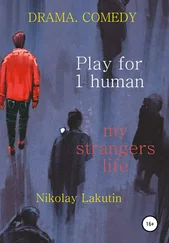Douglas Hofstadter - I Am a Strange Loop
Здесь есть возможность читать онлайн «Douglas Hofstadter - I Am a Strange Loop» весь текст электронной книги совершенно бесплатно (целиком полную версию без сокращений). В некоторых случаях можно слушать аудио, скачать через торрент в формате fb2 и присутствует краткое содержание. Жанр: Прочая документальная литература, на английском языке. Описание произведения, (предисловие) а так же отзывы посетителей доступны на портале библиотеки ЛибКат.
- Название:I Am a Strange Loop
- Автор:
- Жанр:
- Год:неизвестен
- ISBN:нет данных
- Рейтинг книги:4 / 5. Голосов: 1
-
Избранное:Добавить в избранное
- Отзывы:
-
Ваша оценка:
- 80
- 1
- 2
- 3
- 4
- 5
I Am a Strange Loop: краткое содержание, описание и аннотация
Предлагаем к чтению аннотацию, описание, краткое содержание или предисловие (зависит от того, что написал сам автор книги «I Am a Strange Loop»). Если вы не нашли необходимую информацию о книге — напишите в комментариях, мы постараемся отыскать её.
I Am a Strange Loop — читать онлайн бесплатно полную книгу (весь текст) целиком
Ниже представлен текст книги, разбитый по страницам. Система сохранения места последней прочитанной страницы, позволяет с удобством читать онлайн бесплатно книгу «I Am a Strange Loop», без необходимости каждый раз заново искать на чём Вы остановились. Поставьте закладку, и сможете в любой момент перейти на страницу, на которой закончили чтение.
Интервал:
Закладка:
Most people I know would rate (either explicitly, in words, or implicitly, through choices made) cat souls as higher than cow souls, cow souls higher than rat souls, rat souls higher than snail souls, snail souls higher than flea souls, and so forth. And so I ask myself, if soul-size distinctions between species are such a commonplace and non-threatening notion, why should we not also be willing to consider some kind of explicit (not just tacit) spectrum of soul-sizes within a single species, and in particular within our own?
From the Depths to the Heights
Having painted myself into a corner in the preceding section, I’ll go out on a limb and make a very crude stab at such a distinction. To do so I will merely cite two ends of a wide spectrum, with yourself and myself, dear reader, presumably falling somewhere in the mid-range (but hopefully closer to the “high” end than to the “low” one).
At the low end, then, I would place uncontrollably violent psychopaths — adults essentially incapable of internalizing other people’s (or animals’) mental states, and who because of this incapacity routinely commit violent acts against other beings. It may simply be these people’s misfortune to have been born this way, but whatever the reason, I class them at the low end of the spectrum. To put it bluntly, these are people who are not as conscious as normal adults are, which is to say, they have smaller souls.
I won’t suggest a numerical huneker count, because that would place us in the domain of the ludicrous. I simply hope that you see my general point and don’t find it an immoral view. It’s not much different, after all, from saying that such people should be kept behind bars, and no one I know considers prisons to be immoral institutions per se (it’s another matter how they are run, of course).
What about the high end of the spectrum? I suspect it will come as no surprise that I would point to individuals whose behavior is essentially the opposite of that of violent psychopaths. This means gentle people such as Mohandas Gandhi, Eleanor Roosevelt, Raoul Wallenberg, Jean Moulin, Mother Teresa, Martin Luther King, and César Chávez — extraordinary individuals whose deep empathy for those who suffer leads them to devote a large part of their lives to helping others, and to doing so in nonviolent fashions. Such people, I propose, are more conscious than normal adults are, which is to say, they have greater souls.
Although I seldom attach much weight to the etymologies of words, I was delighted to notice, when preparing a lecture on these ideas a few years ago, that the word “magnanimity”, which for us is essentially a synonym of “generosity”, originally meant, in Latin, “having a great soul” ( animus meaning “soul”). It gave me much pleasure to see this familiar word in a new light, thanks to this X-ray. (And then, to my surprise, in preparing this book’s rather fanatical index, I discovered that “Mahatma” — the title of respect usually given to Gandhi — also means “great soul”.) Another appealing etymology is that of “compassion”, which comes from Latin roots meaning “suffering along with”. These hidden messages echoing down the millennia stimulated me to explore this further.
The Magnanimity of Albert Schweitzer
My personal paragon for great-souledness is the theologian, musician, writer, and humanitarian Albert Schweitzer, who was born in 1875 in the tiny village of Kaysersberg in Alsace (which was then part of Germany, even though my beloved old French encyclopedia Le Petit Robert 2, dating from exactly one century later, claims him as français !), and who became world-famous for the hospital that he founded in 1913 in Lambaréné, Gabon, and where he worked for over fifty years.
Already at a very young age, Schweitzer identified with others, felt pity and compassion for them, and wanted to spare them pain. Where did this empathic generosity come from? Who can say? For example, on his very first day at school, six-year-old Albert noticed that he had been decked out by his parents in fancier clothes than his schoolmates, and this disparity disturbed him greatly. From that day onward, he insisted on dressing just like his poorer schoolmates.
A vivid excerpt from Schweitzer’s autobiographical opus Aus meiner Kindheit und Jugendzeit portrays the compassion that pervaded his life:
As far as I can peer back into my childhood, I suffered from all the misery that I saw in the world around me. I truly never knew a simple, youthful joie de vivre, and I believe that this is the case for many children, even if from the outside they give the appearance of being completely happy and carefree.
In particular, I was tormented by the fact that poor animals had to endure such great pain and need. The sight of an old, limping horse being dragged along by one man while another man beat it with a stick as it was being driven to the Colmar slaughterhouse haunted me for weeks. Even before I entered school, I found it incomprehensible that in my evening prayer I was supposed to pray only for the sake of human beings. And so I secretly spoke the words to a prayer that I had made up myself. It ran this way: “Dear God, protect and bless everything that breathes, keep it from all evil, and let it softly sleep.”
Schweitzer’s compassion for animals was not limited to mammals but extended all the way down the spectrum to such lowly creatures as worms and ants. (I say “all the way down” and “lowly” not to indicate disdain, but only to suggest that Schweitzer, like nearly all humans, must have had a “consciousness cone”, vaguely like mine on page 19. Such a mental hierarchy can just as easily give rise to a sense of concern and responsibility as to a sense of disdain.) He once remarked to a ten-year-old boy who was about to step on an ant, “That’s my personal ant. You’re liable to break its legs!” He would routinely pick up a worm he saw in the middle of a street or an insect flailing in a pond and place it in a field or on a plant so that it could try to survive. Indeed, he commented rather bitterly, “Whenever I help an insect in distress, I do so in an attempt to atone for some of the guilt contracted by humanity for its crimes against animals.”
As is well known, Schweitzer’s simple but profound guiding principle was what he termed “reverence for life”. In the address delivered when he was awarded the Nobel Prize for Peace in 1953, Schweitzer declared:
The human spirit is not dead. It lives on in secret… It has come to believe that compassion, in which all ethics must take root, can only attain its full breadth and depth if it embraces all living creatures and does not limit itself to human beings.
The following anecdote, also from Aus meiner Kindheit und Jugendzeit, is particularly revealing. In the springtime, with Easter approaching, little Albert, seven or eight years old, had been invited by a comrade — a comrade-in-arms, quite literally! — to go on an adventure of killing birds with slingshots that they had just made together. Looking back at this turning point in his life from the perspective of many decades later, Schweitzer recalls:
This was an abhorrent proposal, but I dared not refuse out of fear that he would mock me. Soon we found ourselves standing near a leafless tree whose branches were filled with birds singing out gaily in the morning, without any fear of us. My companion, crouching low like an Indian on a hunt, placed a pebble in the leather pouch of his slingshot and stretched it tightly. Obeying the imperious glance he threw at me, I did the same, while fighting sharp pangs of conscience and at the same time vowing firmly to myself that I would shoot when he did.
Читать дальшеИнтервал:
Закладка:
Похожие книги на «I Am a Strange Loop»
Представляем Вашему вниманию похожие книги на «I Am a Strange Loop» списком для выбора. Мы отобрали схожую по названию и смыслу литературу в надежде предоставить читателям больше вариантов отыскать новые, интересные, ещё непрочитанные произведения.
Обсуждение, отзывы о книге «I Am a Strange Loop» и просто собственные мнения читателей. Оставьте ваши комментарии, напишите, что Вы думаете о произведении, его смысле или главных героях. Укажите что конкретно понравилось, а что нет, и почему Вы так считаете.












